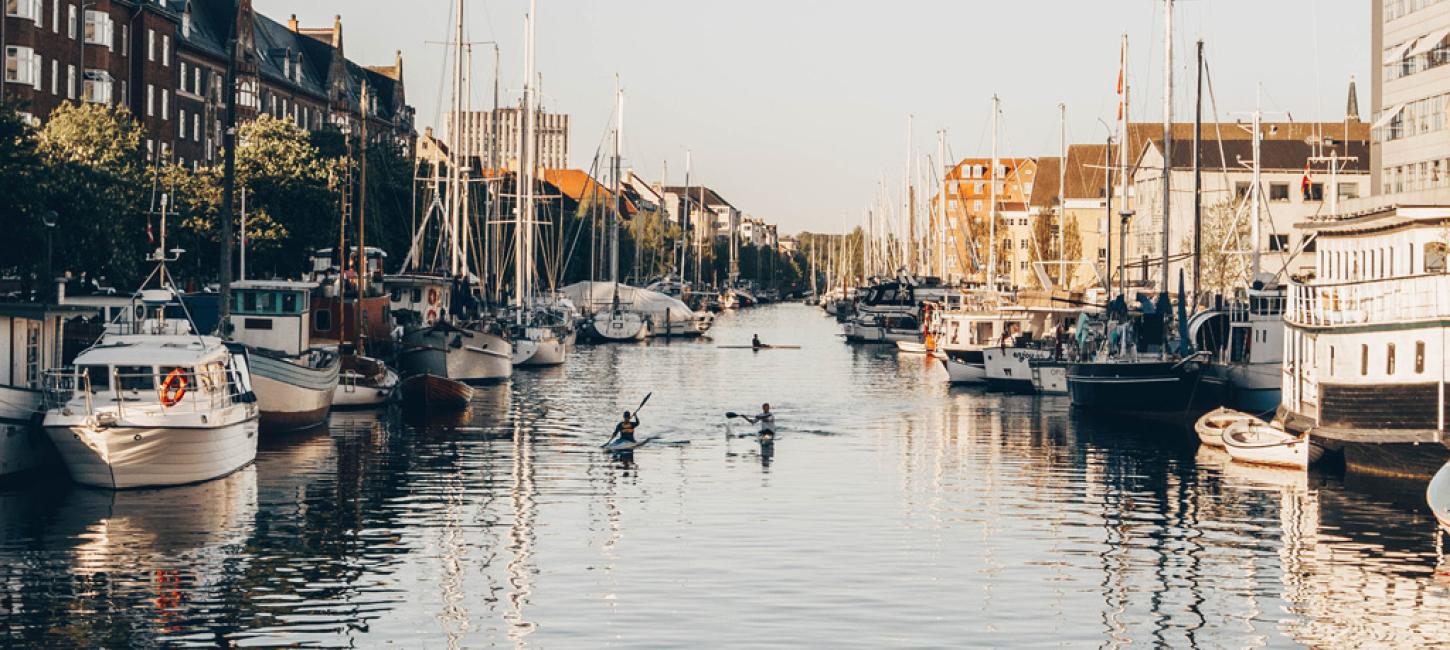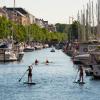Basic need-to-know information
Find practical information on weather, currency, VAT, safety and much more when heading to Copenhagen.
Click on the topic below and a brief, informative text will unfold.
Which currency is used?
The currency in Denmark is Danish Kroner (DKK). One krone is divided into 100 Øre.
If you are carrying more than EUR 10,000, when travelling in or out of Denmark, you have to declare it to SKAT. This applies regardless of whether you travel to and from another EU member state or a non-EU member state.
Most places accept Euros, while some accept American Dollars, Norwegian- and Swedish Kroner, but please note that the exchange rate is not to your benefit.
Customs and VAT
Danish prices include 25% Value Added Tax (VAT). It is refundable to persons who are non-EU residents and who are travelling to a non-EU destination. Tax-free shopping is possible in many major shops and department stores in Copenhagen.
Goods into Denmark
The amount and types of goods you can import into Denmark without customs duty depend on whether you arrive from an EU country or a non-EU country. For information about duty-free allowances, please visit the website of SKAT - the Danish Customs and Tax Authorities.
Goods out of Denmark and VAT refunds
Citizens from countries outside the EU and Scandinavia are also eligible for a Value Added Tax (VAT) refund when goods purchased in Denmark are shipped to another country. VAT can be refunded at the airport upon presenting a completed VAT refund form. To achieve the VAT refund, the minimum purchase per shop must be DKK 300. There are two refund companies offering refund services, Tax-Free Worldwide and Global Blue Denmark.
Credit cards
The most common credit card in Copenhagen is VISA, but you should have no problem finding ATMs/cash machines that accept Mastercard and American Express as well. Bring your PIN code.
In Copenhagen major credit cards are widely accepted at hotels, stores, cafes and restaurants. It is a good idea always to ask beforehand though. Some places might charge a fee when accepting foreign credit cards as payment. Be sure to bring your PIN code and a picture ID when using a credit card in Denmark.
For authorisation of payment with credit cards, call the Danish PBS/Nets customer service hotline on +45 4489 2180.
Lost or stolen cards
If your credit card gets lost or stolen while you are in Copenhagen, call the Danish PBS/Nets 24-hour hotline on tel.: +45 4489 2750 to block your card.
ATMs/cash machines
ATMs offer a convenient way of withdrawing Danish money on a credit or debit card. Most banks have ATMs outside that are open 24 hours. All major cards are accepted.
Banks and bureaux de change
Banks are open from 09:30 to 16:00 on weekdays with late hours until 18:00 on Thursdays (closed Saturdays and Sundays). There are numerous cash machines throughout the city and the plentiful bureaux de change are open during weekends, for example Forex at Nørreport Station and Copenhagen Central Station.
Shops' opening hours
In general, many shops in Copenhagen are closed on Sundays. But not department stores and many major retail stores. On Sundays, it's always advised to check the opening hours of your prefered shops.
Opening hours vary, and department stores and supermarkets usually stay open longer. Outside ordinary shopping hours, various kiosks are open for the sale of tobacco, newspapers and sweets etc. Bakeries, florists and souvenir shops are usually open seven days a week.
These are the most common opening hours:
Monday - Thursday 10:00 - 18:00
Friday 10:00 - 19:00
Saturday 10:00 - 16:00
Sunday 12:00 - 16:00
Electricity
Denmark, like most other European countries, has 220-volt AC, 50Hz current and uses two-pin continental plugs.
If you visit from the UK and Ireland, you will need an adaptor for electric appliances, whereas North Americans need a transformer in order to use their 110/125V appliances.
Lost property and theft
If you lose your property, either by mistake or theft, in Copenhagen, here is where to call or go.
Main lost property office
Copenhagen Police Polititorvet, Hittegodskontoret 1567 København V
Tel.: +45 3874 8822
Opening hours: Monday - Friday 09:00 - 14:00
Airport
For lost luggage or possessions left behind on a plane, contact the relevant airline or:
Copenhagen Air Service Copenhagen Airport
Tel.: +45 3247 4725
Opening hours: Daily 08.00 - 20.00
Buses
Call Din Offentlige Transport (DOT) and state the number of the bus on which you have lost your property.
Tel.: +70 15 70 00.
Trains
Call the relevant terminus (end station of the line you travelled by) or the central S-train information office in Copenhagen.
Tel.: +45 2468 0960
Opening hours: Mon-Sun 10.00 - 13.00
Lost property is kept for up to seven days and if it has not been picked it will be handed over to the police.
Trick or pocket thieves
Beware of your belongings when you are in locations with large crowds of people, for example, while using public transportation, at Copenhagen Central Station, Nørreport Station, Copenhagen Visitor Centre and the pedestrian shopping street Strøget. In case your belongings are stolen, please contact the Danish police.
Emergencies
In case of an emergency while you are in Copenhagen, always dial 112. It is a free call which will connect you to the police, fire brigade or hospital. If you need a chemist or dentist, there are a few which are open 24 hours.
Police, fire brigade and ambulance
Call (+45) 112 for life threatening emergencies and ask for the police, fire department or ambulance service.
Call (+45) 1813 for injuries or sudden illness and speak to a nurse or doctor, or to go to a hospital emergency department.
Call (+45) 114 for police, when it is not an emergency.
Speak slowly and distinctly. State telephone number and address. Emergency calls from public pay phones are free. Go to the website of the Danish police.
24-hour chemist
There is no shortage of pharmacies in Copenhagen; just look for the green "a" sign that symbolises the Danish word for chemist: Apotek.
Steno Apotek, Vesterbrogade 6C, 1620 Copenhagen V, tel.: +45 3314 8266
Glostrup Apotek, Hovedvejen 101, 2600 Glostrup, tel.: +45 4396 0020
Lyngby Svane Apotek, Lyngby Hovedgade 27, 2800 Kongens Lyngby, tel.: +45 4587 0096
Hillerød Frederiksborg Apotek, Slotsgade 26, 3400 Hillerød, tel.: +45 4826 5600
Private doctor
The Doctors at Laegelinien provide competent health care day and night. Telephone consultations and prescriptions from DKK 130. House and hotel calls from DKK 1200.
Tel.: +45 2596 9375 and online at Laegelinien.dk.
The Private Doctor is on call seven days a week, 08:00 - 24:00. House or hotel calls within an hour. Prices start at DKK 1,400. House calls and clinic consultations are the same price. Acute dental treatment can also be organised. Tel.: +45 6075 4070.
Hospital Emergency Wards
Always call (+45) 1813 before going to a hospital emergency department. They will not admit you otherwise.
The following hospitals have 24-hour emergency wards:
Bispebjerg Hospital, Bispebjerg Bakke 23, 2400 Copenhagen NV, tel.: +45 3531 3531
Herlev Hospital, Herlev Ringvej 75, 2730 Herlev, tel.: +45 3868 3868
Hvidovre Hospital, Kettegårds Alle 30, 2650 Hvidovre, tel.: +45 3632 3632
Nordsjællands Hospital, Bakkedraget, 3400 Hillerød, tel.: +45 4829 4829
The following hospitals' emergency wards are open 07:00-22:00:
Frederikssund Hospital, Frederikssundsvej 30, 3600 Frederikssund, tel.: +45 4829 5000
Amager Hospital, Italiensvej 1, 2300 Copenhagen S, tel.: +45 3234 3500
Frederiksberg Hospital, Nordre Fasanvej 57, 2000 Frederiksberg, tel.: +45 3816 3816
Gentofte Hospital, Niels Andersens Vej 65, 2900 Hellerup, tel.: +45 3977 3977
Glostrup Hospital, Nordre Ringvej 57, 2600 Glostrup, tel.: +45 3863 3863
Dentist - emergency only
Open daily 20:00 - 21:30, weekends and holidays also 10:00 - noon.
Tandlægevagten, Oslo Plads 14, 2100 Copenhagen Ø. Tel.: (+45) 1813
Missing children
Always contact the police.
Language
In Copenhagen, the mother tongue is Danish, which is closely related to both Swedish and Norwegian. In general Danes speak English extremely well, and some even German and French.
In the Danish schools, English is taught from a very early age alongside German and to some extent French. Music and mass media have made their impact too. Films and TV programmes are always broadcasted in the original language with Danish subtitles.
The older generation who went to school during WW1 ususally know German better than they know English.
Luggage storage and services
LuggageHero
While you are out and about experiencing Copenhagen, have your luggage securely stored by one of LuggageHero’s many certified shops, located all over the city. Learn more here.
COPENHAGEN LUGGAGE SERVICE
To Airport: We will deliver it to our storage at the airport, where you can pick it up when you are ready to check-in
To cruise ship: We will check in your baggage all the way to your cabin on the ship
To the hotel: We will deliver your baggage to the hotel reception
We offer to transfer your luggage to & from Copenhagen Airport to your hotel, cruise ship or your accommodation at a private address.
From cruise ship: We simply pick up your baggage from the port terminal before 9 am
From the hotel: We pick up your baggage from the hotel reception before 12.00 am
From Private address (AirBnB): We will meet with you between 7-11 am
Price per normal size bag EUR 12,95 /minimum 3 bags per service
We also transfer bikes, surfboards, golf bags and other odd-size items. (+EUR 5 per item)
We are located in terminal 3, CPH airport.
Copenhagen Airport
There are baggage lockers placed by Parkeringshus 4 (P4) in Copenhagen Airport.
Prices for lockers:
Small locker (36 x 44 x 57 cm) costs DKK 60 per 4 hours or DKK 80 for 24 hours
Large locker (46 x 60 x 82 cm) costs DKK 80 per 4 hours or DKK 100 for 24 hours
Ski / Golf locker (32 x 186 x 57) costs DKK 100 per 4 hours or DKK 120 for 24 hours
It's only possible to pay with a credit card (VISA or Mastercard). You choose and pre-pay for a period of either 4 or 24 hours. Afterwards, it's possible to pay for storage of up to maximum of 7 days.
For further information, check their website.
Copenhagen Central Station
Lockers for luggage storage are located by the exit to Istedgade street at Copenhagen Central Station. The luggage storage is open during these hours:
- Monday-Saturday 05:30 - 01:00
- Sunday and bank holidays 06:00 - 01:00
- 24 December 08:00-16:00
- 25 December 08:00-01:00
- 26 December 08:00-01:00
- 31 December 08:00-17:00
- 1 January 08:00-01:00
Prices for lockers:
Small locker (35 x 45 x 90 cm) costs DKK 70 per 24 hours
Large locker (35 x 60 x 90 cm) costs DKK 80 per 24 hours
Bike DKK 85 per 24 hours
Prices for staffed storage:
Small pieces of luggage costs DKK 75 per 24 hours
Large pieces of luggage costs DKK 85 per 24 hours
Luggage cannot be stored for more than 10 days. If you need it stored longer, please contact the staff at the storage.
For more information, please go to the Danish website for Copenhagen Central Station.
Segway Tours Storage
Segway Tours Copenhagen has a 400 sq/m office space located in the city center to safely store your luggage, while you enjoy Copenhagen luggage free.
They are open from 8.30 am to 5.30 pm every day all year long, ready to take care of your luggage. They charge DKK40 kr or the equivalent of €5 EUR per bag for the day, and if you rent one of their bikes or do a Segway tour with them it's of course free of charge.
For further information, check their website.
Holidays
Many attractions and shops in Copenhagen close on public holidays.
Travelling with a disability
During the last decade, Copenhagen has developed to be more accessible for people travelling with a disability, which means that today, you have access to many of the city’s attractions, hotels and services in spite of whatever disability you might have.
You must be aware that Copenhagen is an old city, so surfaces in the inner city can be tough to pass when in a wheelchair, stores might be hard to enter because of small steps, and old buildings might not have elevators installed. Therefore, we suggest you keep one step ahead and call upfront to the place, you want to visit and ask them about their facilities.
Below, we have made an overview of how to get around, where to live and what attractions you can visit in Copenhagen, if you have a disability.
TRANSPORTATION
The transportation system in Copenhagen is very suitable for wheelchairs, and both metro- and train stations have elevators and/or access for wheelchairs.
Metro
When build, the metro was designed to be accessible for everyone, no matter your circumstances. Therefore, every metro station is equipped with an elevator or a lift.
Train
If you travel by train, you have to wait at the front carriage and signal the train driver as the train arrives, then he will assist you onto the train by a ramp. Remember to tell, at which station you wish to get off the train.
Bus
Most busses in Copenhagen have a collapsible slope by the door in the middle of the bus. You get access to the slope by pressing the button on the right side of the door. As you push the button, you signal the driver, who then unfolds the slope. Contrary to the train, the chauffeur on the bus cannot assist with entry or exit.
Taxa service
Should you choose to use a taxa, you can hail any taxi, if you have a collapsible wheelchair. If not, you have to call the taxi company and order handicap transportation up front for your trip.
ACCOMODATION
Most hotels in Copenhagen have facilities to meet your needs, when you have a disability.
Please note that all Scandic and CABINN hotels are handicap-friendly, and so are Bella Sky, Mariott Hotel, d’Angleterre, Imperial Hotel and Tivoli Hotel.
ATTRACTIONS
Many attractions in Copenhagen have access for people travelling with a disability. Both new attractions, like National Aquarium of Denmark, and older places, like Tivoli Gardens, The National Museum of Denmark and the old castles, like Christiansborg Palace and Frederiksborg Castle have facilities, which make them accessible for everyone.
We advice you to contact a given attraction attraction in advance to make sure it has the necessary facilities. Many of the major attractions also have information about their accessibility initatives on their websites.
Smoking
Denmark has a smoking ban in all public indoor areas along with most other western European countries.
In Copenhagen, smoking is forbidden in public buildings and private businesses - including restaurants, shops, transport, entertainment venues, workplaces etc.
The only exception from the ban is for establishments with an area less than 40 square metres, that do not serve fresh food - so you can still enjoy a cigarette in some smaller pubs. Some places have installed special smoking rooms but most refer smokers to the streets.
Likewise, if you visit a Danish home - smoking and non-smoking - it is expected that you step outside if you need to smoke.
Tipping
In Copenhagen, tipping is not a tradition. If you receive extraordinary good service, you are welcome to reward it with a tip, but it is not expected.
Service is normally included in the bill at restaurants, hotels and taxis. Thus it is optional whether to round up the bill or not. Waiters and waitresses, taxi drivers etc. earn higher wages than in other countries and are not dependent on tips in the same way.
Tipping is greatly appreciated, but not expected, and you should only do so if you feel you are getting exceptionally good service. If you do tip, 10 percent of the bill is sufficient.
Visas, passports and driving licenses
If you wish to visit Copenhagen, you should inquire whether you will need a visa or not. If you do, make sure to file an application in due time.
If you are an EU citizen, you must either present a passport or an ID card valid for the duration of your stay in order to enter Denmark for tourist visits of up to three months.
Citizens of other countries must have a valid passport. Some non-EU citizens are required to produce a visa. Please contact your travel agent or the nearest Danish diplomatic post for further information.
In Denmark, your foreign driving licence is valid in up to 90 days. After this period, you'll have to apply for a Danish (temporary) driving licence. Please note that the information on your licence must be written with Latin letters.
Find more information at the website of the Ministry of Foreign Affairs of Denmark.
What's the weather like in Copenhagen?
What's the weather like in Copenhagen?
The climate in Copenhagen follows the four seasons of the northern hemisphere, but temperatures can vary considerably during the year. July and August are normally the warmest months of the year with an average temperature of 20 degrees Celcius and 68 degrees Fahrenheit. February is generally the coldest with an average of 2 degrees Celcius and 35 degrees Fahrenheit. Unfortunately, snow is not something we can guarantee each winter. When it occurs, it’s typically from December until spring, but snow rarely lasts long.
Temperatures in Copenhagen
The average temperatures in Celcius in Copenhagen are (month: day / night):
- Jan: 1,9 / -2,0
- Feb: 2,0 / -2,4
- Mar: 4,8 / -0,6
- Apr: 9,5 / 2,3
- May: 15 / 7,2
- Jun: 19,2 / 11,3
- Jul: 20,4 / 12,9
- Aug: 20,3 / 12,6
- Sep: 16,7 / 9,8
- Oct: 12,1 / 6,7
- Nov: 7,1 / 2,7
- Dec: 3,7 / -0,5
Month: day / night (everage temperatures in Fahrenheit)
- Jan: 35,4 / 28,4
- Feb: 35,6 / 27,7
- Mar: 40,6 / 30,9
- Apr: 49,1 / 36,1
- May: 59,0 / 45,0
- Jun: 66,6 / 52,3
- Jul: 68,7 / 55,2
- Aug: 68,5 / 54,7
- Sep: 62,1 / 49,6
- Oct: 53,8 / 44,1
- Nov: 44,8 / 36,9
- Dec: 38,7 / 31,1






